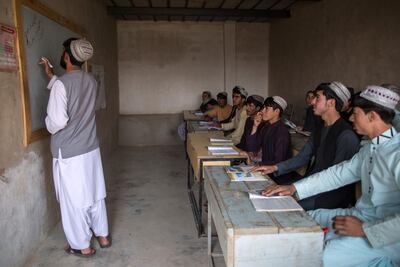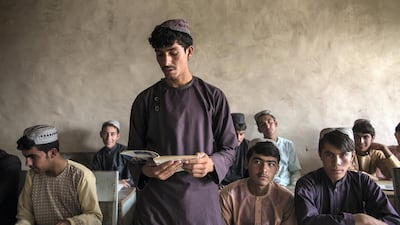The high school in Passab village, in Afghanistan’s Kandahar province, first had to close its doors after being caught in crossfire shortly after the US-led invasion in 2001.
Its buildings were destroyed, its classrooms looted.
It reopened weeks after but for more than a decade pupils gathered amid the rubble, studying in flimsy tents or under the scorching sun.
Then three years ago a pupil, 17, decided to rebuild the entire school.
Khalil, now 20, was fed up with the old tents that barely provided shelter from either sun or rain, and that many children had to stay at home because their parents did not want to send them to such a temporary set-up.
“I knew that something needed to change, so I approached my classmates and told them I wanted to build a proper school," Khalil says. "They were immediately on board.”
With no funds available, he had to be creative. He borrowed a tractor from his father, a vegetable farmer, and told teachers and students that everyone’s help was necessary.
“And that’s how it started,” Khalil smiles. “We had no engineers and none of us had ever built anything, but with parents and teachers helping it quickly became a community project.
"In the mornings we’d study and in the afternoons we built our school.”
Even with new functioning buildings, however, the school could not avoid Covid-19 restrictions. It is one of many that are closed to pupils while the pandemic rages.
Afghanistan officially had about 40,000 confirmed coronavirus cases but with limited testing available, numbers are thought to be much higher.
A survey conducted by the Ministry of Public Health analysing antibodies found that up to 10 million Afghans probably had the virus.
Acting Health Minister Ahmad Osmani said the survey showed 31.5 per cent of the population had been infected and recovered.
Education activists have taken to social media, decrying a public school system that has been gutted by conflict and coronavirus, and asking for schools to open again immediately.
Private, tuition-based schools have long reopened since being closed in March to prevent the spread of the disease, and even senior high school pupils at public institutions returned to class.
But millions of children remain affected by large-scale school closures and it is feared that many will not return to class at all.
The Afghan government announced this week that schools throughout the country should open in October but obstacles remain.
Afghanistan’s schools were in crisis before the pandemic, with the number of studying children falling in many provinces as conflict escalated and donor funding ended, a Human Rights Watch report found.
“Now things are even worse,” said Heather Barr, the group's co-director for women’s rights.
“With only 30 per cent of women and 55 per cent of men literate, many parents cannot help their children to study.”
Even before the pandemic, an estimated 3.7 million children across Afghanistan’s 34 provinces were out of school, Unicef said, with girls from lower-income families at risk of being married off.
The Ministry of Education reported that at least 7,000 schools still did not have a building.
And with most of Afghanistan’s funding being spend on defence, little is left for repairing classrooms that are destroyed by extreme weather, a lack of maintenance and the war.
But Passab’s high school is an example of the kind of Afghan spirit that can be witnessed throughout the country.
With the government offering few services, people are willing to invest and make sacrifices to build their country.

After the destruction, a mere 180 pupils, most of them boys, gathered amid the rubble, determined to study anyway.
Today the school has expanded to 850 children studying in 11 brick classrooms.
The school, about 30 minutes’ drive from Kandahar’s provincial capital in southern Afghanistan, is painted white with the colours of the Afghan flag lining each classroom’s door frame.
Each room is equipped with desks and benches, and the pupils even dug a borehole for access to clean water.
With the new classrooms opening three years ago, pupil numbers peaked and teachers decided to offer two sessions – one in the morning and one in the afternoon.
The school is due to reopen after its enforced Covid-19 closure but challenges remain.
“Students have barely attended classes this year and in a few months the weather will be too cold once again for children to sit in a classroom," said education activist Freshta Karim, who has been pushing for the reopening of schools
"The government most probably doesn’t have enough budget to heat schools. Besides that, who will the government compensate for the lost months?”
Ms Karim said she remained optimistic nonetheless.
“It’s an achievement to have public schools reopened,” she said.
While the pandemic continues to affect people throughout Afghanistan, life has returned to normal, with neither restrictions nor lockdowns enforced.
That is one of the reasons why private schools, not reliant on government funding, opened their doors a long time ago.
"This has created divisions between students from well-off families and students depending on the public education sector," Ms Karim told The National.
While short televised lessons were regularly broadcast throughout the country over the past months, many children remain without TVs at home.
As the Taliban and the Afghan government meet in Doha for a first round of direct negotiations, pupils hope that any future power-sharing deal would consider the importance of education.
“We’ve long needed peace in Afghanistan but education is at the heart of it," Khalid says.
"It’s the key. If every child in this country would be able to attend and finish school, we will see a bright future.”

